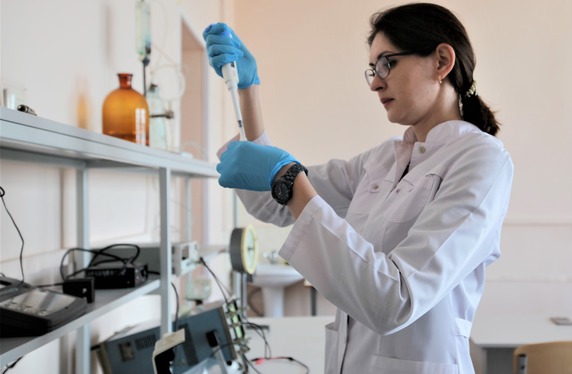Metabolic Syndrome: Modern problem requires a modern solution
31.03.2020

Metabolic syndrome is becoming commoner due to a rise in obesity rates among young people for the past few years. Researchers at Siberian State Medical University are developing novel beneficial strategies correcting the metabolic syndrome.
Yulia Birulina (Cand.Biol.Sci., associate professor of the Division of Biophysics and Functional Diagnostics) received the Scholarship of the President of the Russian Federation for strengthening state support of young Russian scientists - candidates and doctors of sciences. Research, supported by the grant, aims to address the critical problem of modern society related to searching for the novel effective treatment for the metabolic syndrome as a whole.
The term "metabolic syndrome" (MetS) was first used in the early 1980s. Although previously thought that middle-aged patients are expected to have a higher incidence of MetS (insulin resistance syndrome - editor's note), now the prevalence of the metabolic syndrome is increasing in both children and adolescents.
The metabolic syndrome has become the major health hazard of the modern world due to the worldwide increase in the number of people suffering from obesity and cardiovascular diseases, which remain the leading causes of death worldwide.
The latest findings have shown that MetS causes the development of abnormal red cell structure and function. Peripheral red blood cells traditionally serve as a model for studying the plasma membrane ion transport in normal and pathological conditions and can be used as an indicator of the degree of damage in various pathological processes. Additionally, metabolic syndrome may also increase the risk of thrombosis by increasing platelet aggregation. Yulia Birulina explained: «The use of substances that inhibit platelet aggregation is always associated with an increased risk of bleeding. In this regard, there is a need to develop the most efficient approaches to deal with it».
Researchers hope that hydrogen sulfide (H2S) will help to resolve this issue because it plays a significant role in the regulation of physiological and pathophysiological processes. This compound is considered as a potential cytoprotective agent in providing cardiovascular homeostasis. In the past years, biomedical research has recognized hydrogen sulfide (H2S) as an important biological gasotransmitter with paramount roles in health and disease.
The study of targets of gasotransmitters and features of their interaction with red blood cells is one of the priority research areas of the Division of Biophysics and Functional Diagnostics. At the same time, the research team of the division, over a long period, has been investigating red blood cells and blood platelets dysfunction in metabolic syndrome, a patent application for the model has been filled.
The funding will allow researchers to examine in greater detail the varied effects of hydrogen sulfide (H2S) and its impact on hemocyte function. Research results will provide an important input to the development of novel therapeutic approaches in metabolic syndrome, which allow improving the patients' quality of life by reducing the risk of cardiovascular diseases.
To find out more information on the research, please check out the most recent articles:
- H2S-Mediated Changes in Erythrocyte Volume: Role of Gardos Channels, Na+,K+,2Cl— Cotransport and Anion Exchanger
- Role of Carbon Monoxide in the Mechanisms of Action of Extracellular ATP on Contractile Activity of Vascular Smooth Muscle Cells
- Effects of hydrogen sulfide on the Gardos channels activity in erythrocytes


